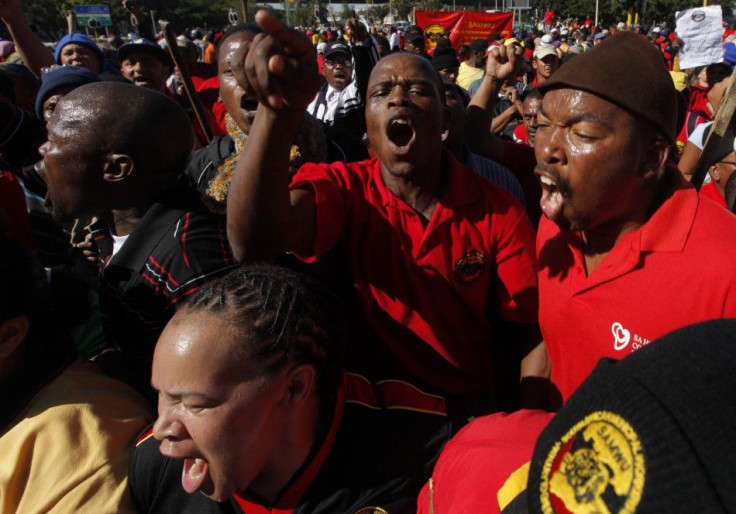Verizon Strike 2011: The South African Example, Where Strikes Are Endemic

While the U.S. is closely watching developments in the strike by 45,000 employees against Verizon Communications Inc. (NYSE: VZ), the country of South Africa is in the midst of a massive waves of strikes by tens of thousands of workers across many industries which threaten to paralyze the national economy.
On Monday, a local government union in Johannesburg called an open-ended strike to demand for higher wages, resulting in 200,000 workers, including garbage collectors and bus drivers, to walk off the job.
City workers have been offered a 6 percent rise in wages, but they want an 18 percent hike (more than three times the headline inflation figure for June).
A spokesman for the South African Municipal Workers Union told reporters: "The strike is indefinite, it will end when the employers come to the table with a reasonable offer. Our bottom line however is 10 percent, we won't accept anything less. We are happy that our members have accepted and responded to our call for a strike.”
However, The South African Local Government Association, which represents 278 councils across the country, said it cannot afford the pay hike demands.
“There are no meetings with the employers scheduled today or any time soon,” said the municipal union workers spokesman.
“If they come to us with a reasonable offer and are prepared to meet with us, we’re prepared to call off the strike.”
Strikes are endemic in South Africa, and they are typically accompanied by violence and harassment of those who cross the picket lines.
In fact, local media in Cape Town just reported that strikers had overturned trash cans, set them on fire, and threw sticks at policemen. Moreover, a fire station and clinics in the outlying suburbs were closed after union members reportedly intimidated and threatened staff.
The winter months in South Africa (summer in the Northern hemisphere) are called “strike season” since contracts typically expire at the end of the fiscal year (June 30) lead to massive walk-outs and demands for better wages.
This year has been no different – there have been strikes called by government council workers, coal and gold miners, as well as those employed in pharmaceutical companies, oil refineries and engineering complexes. In nearly every case union representing workers called for salary hikes well in excess of 10 percent – but typically were settles after agreeing to pay boosts of between 7 percent and 10 percent.
Reuters recently reported that a work stoppage has harmed the already=struggling manufacturing sector and has cost South African gold mining companies about $190-million in lost production – which could hurt third quarter economic growth by 0.6 percent.
According to recruitment/human resources company Adcorp warned that the number of work-days lost to strike could leap by more than 20 percent this year to almost 18-million from 14.6-million last year. (Under the apartheid government, this figure peaked at 9-million in the 1980s).
Interesting, more than two-thirds (68 percent) of strikes this year have hit the private sector – in previous years, the public sector usually accounted for the bulk of strikes.
"The strikes in 2011 represents a worrying trend for businesses and investors as the 'strike season' now seems to have become an annual event with strikes also taking place in a number of sectors in both 2009 and 2010," said Mike Davies, associate director at London-based risk analysis group Maplecroft, according to media reports.
The rising wages of South African workers could, in turn, raise inflationary pressures.
"The wide differential between inflation figures and the increases demanded by unions and the weak relationship between wage increases and productivity gains are also concerning," Davies said.
Meanwhile, South Africa’s economy remains fragile and the official unemployment rates hovers at around 25 percent (versus 9 percent in the U.S.)
After the global recession in 2009, South African laid off about one million workers.
The ruling African National Congress (ANC) is closely tied to unions and needs them to deliver votes – as such, there is no political advantage to president Jacob Zuma to pressure unions to give up wage demands.
Relative to other workers in emerging market countries, South African workers are believed to be overpaid and underproductive.
Bonang Mohale, chairman of Shell’s South African subsidiary told reporters last month: “For some of the labor leaders to be absolutely insistent and inflexible about double-digit salary increases, is not sustainable. We end up having fewer, not more jobs. In this ultracompetitive environment, if you as a country aren’t growing, you’re dying.”
He added: The country is now gripped in an extremely pessimistic mood. When business is pessimistic, it errs on the side of caution at a time we need to be expansionary.”
Indeed, an analyst Adcorp, Loane Sharp warned media last month: “Companies are very quietly agreeing to high wage settlements and then just laying off workers. They are not going to stop.”
© Copyright IBTimes 2024. All rights reserved.











